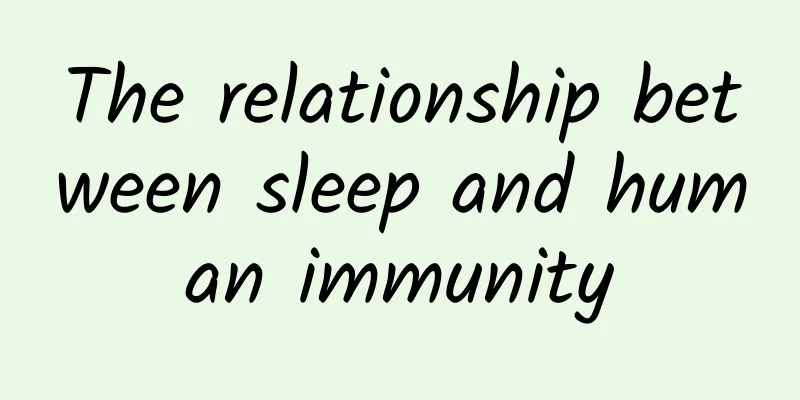The relationship between sleep and human immunity

|
The COVID-19 pandemic has made us realize that everyone is equal in the face of the virus. The rich and the poor, the famous and the unknown, all may be infected. But it is not equal. The virus specifically seeks out those who are susceptible. Through the epidemic, we have discovered that the most effective ability to resist the virus is the human body's immunity. So, please take good care of yourself, including sleep, diet, emotions, and please maintain moderate exercise. 01 Why can sleep improve human immunity? T cells are a type of white blood cell that is crucial to the body's immune response. The more T cells there are, the higher the immunity. German experts compared the T cells of healthy volunteers who had sufficient and insufficient sleep and found that the level of T cell integrin activation in people who had sufficient sleep was significantly higher than that in those who had insufficient sleep. American experts have also conducted experiments on the relationship between sleep and immunity, with 153 volunteers aged between 21 and 55 participating in the experiment. The volunteers inhaled the cold virus through their nasal cavity, and then the researchers followed up and observed their physical condition. The experimental results showed that people who slept less than 7 hours on average had a three times higher risk of catching a cold than those who slept more than 8 hours. Compared with people who fell asleep as soon as they touched the pillow, people who tossed and turned and couldn't sleep had a nearly five times higher risk of catching a cold. 02 How can we have high-quality sleep? You may have learned a lot about proper sleep, but you often ignore them. I'd like to share a BBC documentary about sleep. Although several viewpoints in the documentary are old hat, the BBC crew invited authoritative British sleep experts and sports experts to record how they help patients solve various sleep problems such as insomnia, difficulty falling asleep, snoring, etc. The impact and authenticity of the documentary are particularly strong. After watching it, I was deeply impressed and can't wait to change those incorrect sleeping habits. Kate Silverton, a BBC news broadcaster, and sleep expert Dr Barbara Stone completed the first experiment, which aims to induce the body to slowly fall asleep by lowering its body temperature. Kate Silverton's body temperature rose from 37.4 degrees to 39.6 degrees after taking a bath. After getting out of the bath, she read a book on the bed. When her body temperature dropped back below 37 degrees, she felt very sleepy. Therefore, if you have difficulty falling asleep, you can try taking a bath or soaking your feet tonight one hour before going to bed to raise your body temperature, and then let your body temperature slowly return to sleep. Journalist Donic Damond has suffered from insomnia for a long time. He feels that the night is hell for him. He feels lonely, helpless, irritable and angry due to lack of sleep. He often gets angry with his children and wife. Donic Damond tried various methods to treat insomnia, even taking sleeping pills, but his symptoms did not improve. It wasn't until he joined the "Sleep Restriction Program" that Professor Kaul Espy analyzed his sleep patterns and gave him a sleep plan: Greatly reduce the time he spends in bed and shorten the time he spends in the bedroom. Regardless of whether he is sleepy or not, he can only stay in the bedroom for 6 hours a day. Professor Kaur-Espy said: People with insomnia often stay in bed for a long time in an attempt to catch up on sleep, and shortening the time spent in bed is a difficult task. The plan lasted for 4 weeks, and he had to go to bed at 2 a.m. and get up at 8 a.m. At other times, he had to keep his mind clear. Because he spent less time in bed, Donic Damond had to get up at 8 a.m. no matter how many hours he slept, and he felt extremely tired: I would give anything for half an hour or an hour of sleep. Anyone who has experienced insomnia may understand Donic Damond's feelings. He suffers from insomnia most of the night, and finally falls asleep in the morning, but has to get up at the scheduled time to go to work. Severe lack of sleep will lead to extremely bad mood and even affect the work efficiency of the whole day. If you have sleep disorders, you might want to try using sleep restriction to improve them. You may see unexpected results after a few weeks. If you can sleep 7 hours every night, then your time in bed should be controlled to 8 hours. 7 o'clock in the morning is the fixed time to get up, so the time to go to bed at night should be 11 o'clock. When you have trouble falling asleep and complain to your friends, you often hear the following advice: The BBC uses an experiment to tell us that red wine, like coffee, can not only change our mood, but also affect our sleep. There is no doubt that coffee affects sleep, but red wine has both good and bad effects. The BBC crew found two volunteers, James and Shire, who will spend the night together, not in a romantic hotel, but in the sleep laboratory of the University of Surrey, one of the best laboratories in the UK. James and Charles drank three cups of coffee and red wine respectively a few hours before going to bed, and were then locked in a single room. Sleep experts used instruments to detect how these two substances affected their sleep. Finally, by testing brain waves, it was found that coffee made it difficult for Charles to fall asleep, and the time of deep sleep during sleep decreased. James, who drank red wine, also said after getting up that he felt sleep deprived. Although falling asleep quickly under the influence of alcohol will lead to more deep sleep in the first half of the night, waking up many times in the second half of the night does not help us have a good sleep, but instead disrupts the sleep cycle. Wine and coffee can affect our sleep, but what about food? Aldo Chili is a top British chef. He will work with the crew to find the two best foods to experiment with, to see which type of food helps us sleep and which type of food can keep us awake. A pair of twins who share many of the same genes and the same metabolism were asked to taste two dishes prepared by a chef: one was potato dumplings, which are rich in carbohydrates, and the other was cod fillet, which is rich in protein. Scientists from the University of Westminster used a scientific method to test the twins' alertness after meals. She tested them before meals to have a better comparison effect. The experiment showed that Sandy, who ate carbohydrate-rich potato dumplings, had low alertness because when carbohydrates are digested in the stomach, they release insulin, which helps tryptophan enter the brain, where tryptophan is converted into serotonin, which can make people sleepy. So, this explains why people tend to feel sleepy after eating a full meal. If you have important work to do on a weekday afternoon, try to eat less carbohydrates and more protein-rich foods. This documentary actually contains a lot of scientific knowledge about sleep. Due to the length of the article, I will not go into too much detail. Here are the key points: 1. Take a hot bath one hour before bedtime, so you can fall asleep smoothly when your body temperature drops. 2. Go to bed and wake up at regular times 3. Don’t nap in the morning or evening. It’s best to nap between 2pm and 5pm. 4. Placing a moisturizing strip can relieve snoring 5. Alcohol does not help us sleep 6. There is a group of cells behind the eyes that receive light to help us control our sleep 7. If you want to stay awake during the day, control your carbohydrate intake 8. When you are experiencing jet lag, fasting for 16 hours can help you quickly adjust your biological clock 9. If you have sleep problems caused by stress, you can do muscle relaxation 15 minutes before going to bed. 10. The scent of pure natural lavender and valerian can make people relax Academician Zhang Boli, a member of the National Health and Family Planning Commission, said at a press conference: In fact, we get sick because of the game between viruses and human immunity. Usually, when the virus wins, we get sick. So if we improve our resistance, we are often less likely to be infected, and the infection will be mild. Take care of yourself at all times and wherever you are, work well, eat well, sleep well, and be a calm, gentle, healthy and hardworking person. |
<<: App Annie: U.S. Consumer and Business News Index May 2014: News Apps on Mobile Platforms
>>: App Annie: Mobile Game Index May 2014: New Games Shake Up the iOS Charts
Recommend
Is there any scientific basis for the saying “If you want to live longer, eat until you are 70% full”?
Produced by: Science Popularization China Produce...
What are the dietary taboos when the belly is so big during pregnancy?
Many women have high demands on their body shape ...
Why can't I detect ovulation with an ovulation test strip?
Why can’t ovulation be detected using ovulation t...
How to treat ectopic pregnancy conservatively?
The occurrence of ectopic pregnancy is very harmf...
Bed rest for low gestational sac
In the early stages of pregnancy, the gestational...
These Chinese medicines can replenish blood, replenish qi and remove freckles, you must know!
Modern women are under increasing pressure in lif...
Pain under the chest during late pregnancy
What causes private bone pain in late pregnancy? ...
What are menstrual tampons?
What are menstrual tampons? This is a question th...
What is the reason for the clear watery vaginal discharge?
Leucorrhea is a vaginal discharge produced by wom...
Can I still have a painless abortion after three months?
Because some people get pregnant accidentally or ...
Is it a sign of heat in women when they suddenly have urinary pain?
Everyone should be familiar with the phenomenon o...
Is the left breast nodule serious?
If breast nodules appear, the patient should not ...
Brown discharge after 11 days of abortion
If there is brown discharge 11 days after the abo...
What causes a woman's complexion to turn yellow?
A person's complexion can also reflect whethe...
Pregnant women should not eat bird's nest blindly
We all know that bird's nest is a nourishing ...









